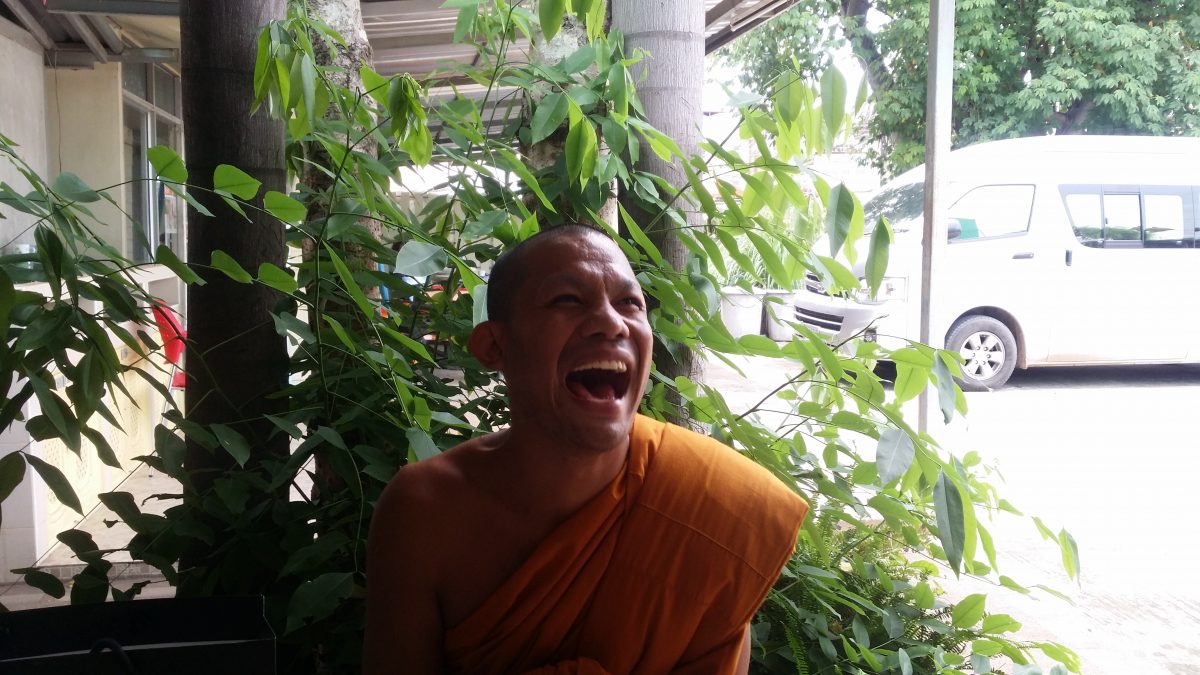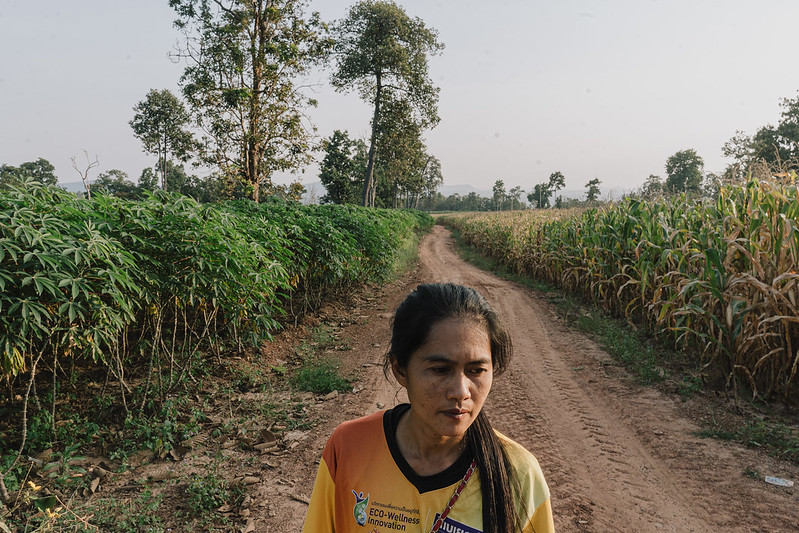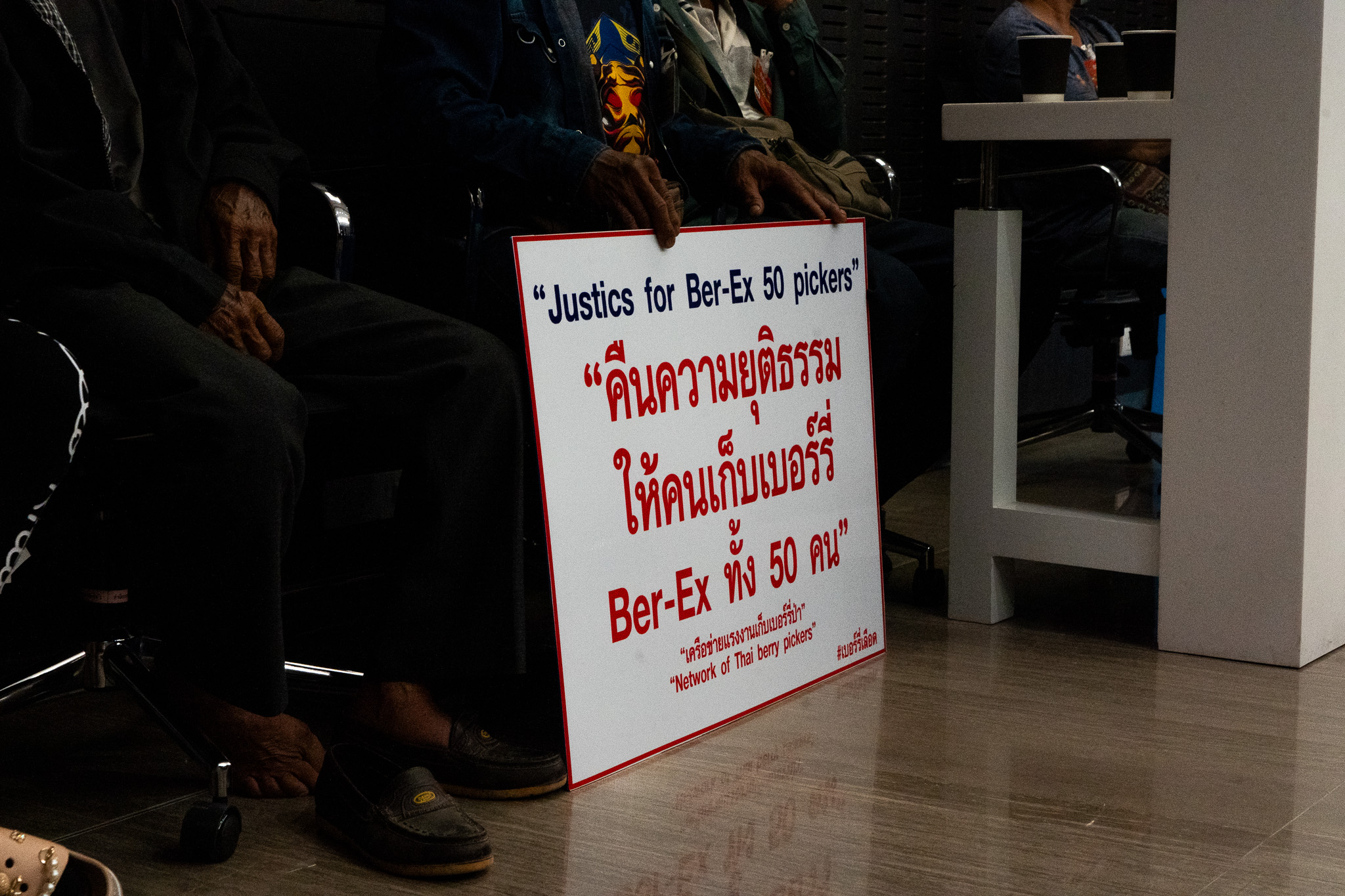Recently released from Bangkok Remand Prison, the molam performer laughs as he tells his story. Mixed with passion, fear, disappointment, and hope, he proudly speaks about his life as an actor, a prisoner, a monk, and an activist.
Guest contribution by Talia Latch and Mike Eckel

Molam performer Patiwat ‘Bank’ Saraiyaem was ordained as a monk for his mother’s sake after serving time for two years for a lèse-majesté offense. He says, “I am happy. I should be happy out of prison.”
A young man laughs as he drinks beer in a bar, where he asked to meet. His hair is short and only slightly longer than when his head was shaved as a monk. He smiles and acts like he is casually meeting friends instead of meeting to talk about his recent hardships. He was behind bars for two years, became a monk, and then ran away from the monastery because it reminded him too much of prison.
Patiwat Saraiyaem, 27, who goes by Bank, grew up in Sakon Nakhon Province in the upper northeastern region of Thailand. He was convicted of lèse-majesté in August 2014 for the words his character said in a play called “The Wolf Bride.” Before prison, Bank was a member of the student union at Khon Kaen University, which boosted his interest in politics.
As the military regime sought to repress voices of opposition after the military coup in May 2014, officials charged the entire cast of the play with lèse-majesté, but only succeeded in arresting Bank and the play’s director. At least two other actors fled into exile in fear of prosecution.
Lèse-majesté refers to committing an insult to the monarchy, an act of treason. The play, put on as part of a commemoration of the October 6, 1976 massacre at Thammasat University, was deemed as violating the law.
Lèse-majesté prosecutions have grown dramatically in Thailand since the May 2014 coup. Before the coup, six people were in jail for lèse-majesté violations. By February 2016, 53 people had been imprisoned. There are still 162 cases under investigation of the 544 cases opened between 2007 and 2015, according to a report from the International Federation for Human Rights.
Once detained, Bank confessed to the charge of lèse-majesté because doing so would lessen his sentence. He confessed even though he does not think he was guilty. The promise of a decreased sentence causes many people accused of lese majeste to confess.
“The word ‘justice’ doesn’t even exist [in Thailand]. I don’t even know what justice is, I’ve never seen justice,” he said. When asked why he laughed while saying those words, he replied, “it’s funny that you ask about justice to a person who has faced injustice.”
Asked if he would still have acted in the play had he known that he would be arrested, he says, “I’m an actor. If I refuse it’s like I refuse my own calling and reject myself.”
Prison
While serving his sentence, Bank was living with prisoners who had committed violent crimes – murderer and rapists – in a high security section of the prison. Another eight prisoners were convicted for lèse-majesté like him. Lèse-majesté prisoners are in the high security building because their cases concern national security. Bank expressed his anger for being put in the same prison as dangerous criminals.
Everyday in prison followed the same routine, “Today is like yesterday, tomorrow will be like today.” The monotony of the routine made Bank feel as though “they took [his] spirit, and stuck prison in [his] mind.”
More than other offenders, political prisoners are monitored daily and then reported on to prison security. In Bank’s case, if the guards were to ever find Bank out of line with the daily routine, they would give him trouble, he says.
Prison could not entirely suppress Bank’s spirit. As an act of resistance he continued to compose and sing molam songs, a type of music particular to the Northeast. Molam music expresses Bank’s soul and spirit, which he says “no one can take away from me.” Bank desires freedom of expression, not only for himself, but for all others. Molam is his medium to express free thought and passion.
When Bank was released from prison in August 2015, he wanted to keep to himself and not contact any friends or family. He did not want anyone to worry about him or get in trouble for associating with him. His friends told him that it would be impossible because if he didn’t talk to anyone, he wouldn’t survive.

Bank, 27, still holds molam performance to be his true calling. To him, true art is not merely entertainment. “If a performance doesn’t have a political flavor, it is not art,” he says.
Monkhood
Bank was supposed to be a monk for 15 days, but quit early. During prison, although he continued to write his songs, he was unable to fully express himself. The monastery also constrained his self-expression. As he described his daily schedule for prison and monkhood, it seemed like he talking about the same place. Being a monk felt like a prison all over again.
People in Isaan often believe that if you go to jail, you have bad luck, but also that if you get ordained, your bad luck goes away. Bank’s mother agrees with this sentiment. In order to fulfill his mother’s wishes and to cleanse his bad luck, he became a monk. But he only followed his mother’s wish. “I feel neutral about being a monk,” he says, “because I believe in every religion.” In prison he studied Christianity and other religions. He believes that God created everyone equally.
Bank could not be confined in a place too similar to prison. Before his 15-day time was up, he snuck out of the temple at midnight on September 5th. There were a lot of things in his mind to think about and he could not get any peace. He said his mom was angry, but he couldn’t stand living there anymore.
Bank leans in and says over a glass of beer, “I was in prison for two years, how can you force me to be in a temple?”
Passion
Bank’s love for performing started when he was 13 years old in a school band. In 2010, Bank enrolled at Khon Kaen University’s Folk Music and Performance Program, the first of its kind in Thailand, to study molam. He has yet to graduate, but it is unclear if the university will allow him to finish his studies.
The songs he performs, usually written by himself, are filled with political message. Bank thinks that his audience can learn about politics through his songs. He wants to educate Northeasterners about politics and democracy. He wants to speak on behalf of oppressed voices in the region and empower people to express themselves.
Bank is disappointed in the justice system; he did not think would ever end up in prison. This disappointment has become rage and frustration towards the system. While serving time, he kept asking, “Why are you doing this to me?” This feeling of frustration, and his ambition to speak against the injustice, got him through prison. Now, he wants people to know the world can be better and more beautiful than what he went through.
At first, every night since he was released from prison, he couldn’t sleep because every time he closed his eyes, he saw prison. Now, he sleeps well again, but he needs to drink alcohol to clear his mind, he says.
Bank continues to put himself at risk by performing his political songs even if he may go to prison again. “It’s my identity, my life, because it’s the thing I have to hold on to. It’s like religion, but it’s my own religion.”
Talia Latch studies Environmental Studies and International Development at Tulane University in New Orleans, Louisiana. Mike Eckel studies Economics at the University of Puget Sound in Tacoma, Washington. They are studying issues of development in the Northeast.





